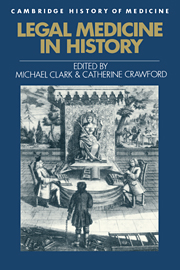Book contents
- Frontmatter
- Contents
- Notes on contributors
- Preface
- Introduction
- I Early modern practice
- II The growth of a science
- III Special offenders
- IV The politics of post-mortems
- V Medical authority in question
- 12 Unbuilt Bloomsbury: medico-legal institutes and forensic science laboratories in England between the wars
- 13 Rex v. Bourne and the medicalization of abortion
- Index
- Cambridge History of Medicine
13 - Rex v. Bourne and the medicalization of abortion
from V - Medical authority in question
Published online by Cambridge University Press: 08 January 2010
- Frontmatter
- Contents
- Notes on contributors
- Preface
- Introduction
- I Early modern practice
- II The growth of a science
- III Special offenders
- IV The politics of post-mortems
- V Medical authority in question
- 12 Unbuilt Bloomsbury: medico-legal institutes and forensic science laboratories in England between the wars
- 13 Rex v. Bourne and the medicalization of abortion
- Index
- Cambridge History of Medicine
Summary
On 27 April 1938 a fourteen-year-old girl, Miss H, was assaulted and brutally raped by a number of guardsmen in a barracks on Horse Guards Parade, Whitehall. Popularly known as ‘the case of the horse with the green tail’ after the enticement which lured the young victim into the barrack's stables, the assault was widely reported and sensationalized by the press. Miss H was subsequently admitted to St Thomas's Hospital for a pregnancy test, which proved to be positive. Her doctor at St Thomas's was not sympathetic to her predicament. He reportedly took the position that ‘he would not interfere with life because the child may be the future Prime Minister of England’ and that in any case, ‘girls always lead men on’. The police surgeon, the doctor at her work, and her school doctor, however, were all of the opinion that Miss H ought not to be left to carry the pregnancy to term. Miss H's parents were desperate to have the pregnancy terminated, but were said to be ‘so respectable that they did not know the address of any abortionist’.
Abortion was a disreputable practice in part because it was illegal. The offence of unlawfully procuring an abortion was laid down in Section 58 of the Offences Against the Person Act 1861, the relevant terms of which provided that:
whosoever, with intent to procure the miscarriage of any woman … shall unlawfully use any instrument or other means whatsoever … shall be guilty of felony, and being convicted thereof shall be liable … to be kept in penal servitude for life.
- Type
- Chapter
- Information
- Legal Medicine in History , pp. 314 - 343Publisher: Cambridge University PressPrint publication year: 1994



